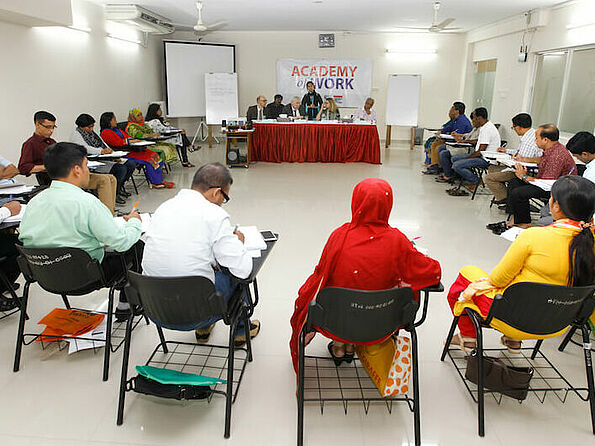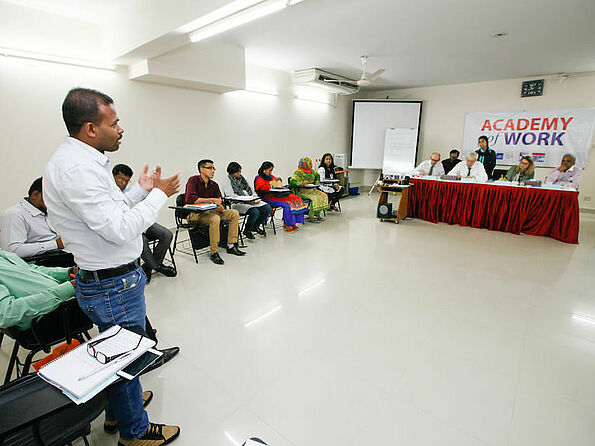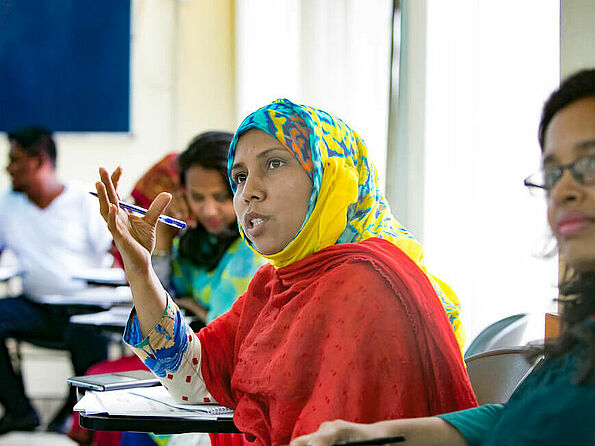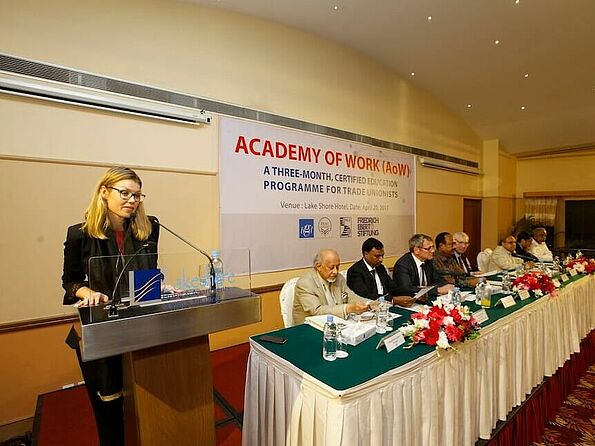FES opens Academy of Work in Bangladesh
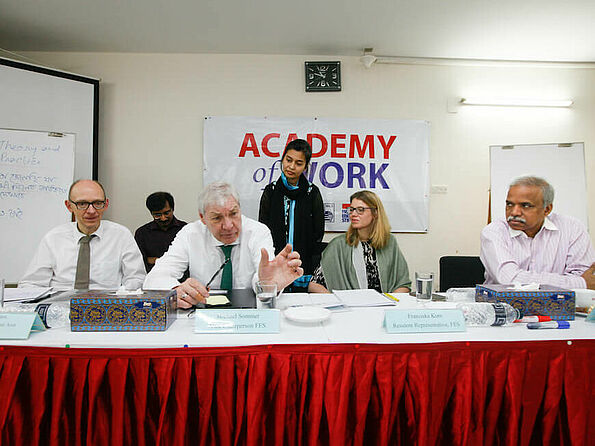
On 24 April 2013, over 1,100 workers were killed and many more were injured when a garment factory on Rana Plaza in Bangladesh collapsed.
Almost exactly four years after that tragic day, Friedrich-Ebert-Stiftung (FES) is opening the Academy of Work in the Bangladeshi capital. Michael Sommer – the vice-chairperson of FES and former longstanding chairman of the German Trade Union Confederation (Deutscher Gewerkschaftsbund-DGB) – was at the opening ceremony in Dhaka. We talked to him about the goals of the academy and the current state of workers’ rights in Bangladesh.
What is the Academy of Work and what are its goals?
The Academy of Work is a unique trainee programme for trade unionists in Bangladesh. Trade union members who work in middle management undergo three-month training courses. We are proud to be partnered with a renowned Bangladeshi university that has academically certified the programme. Another special feature of the programme is that courses are taught in Bangla by primarily local trainers."
The programme material was developed over the course of six months in close cooperation with the Bangladesh Institute of Labour Studies and the Brac Institute of Governance and Development of Brac University.
The result is six thought-provoking modules on subjects such as workers’ rights, trade, globalisation, and the history of trade unions. All the modules not only bring together theoretical material and practical knowledge, but also show the relationship between the local and the global context. The long-term goals of the academy are to contribute to a stronger social dialogue between trade unions and employer associations, and to strengthen trade unions as a whole.
What is the current status of workers’ rights in Bangladesh?
Since the 2013 disaster, major improvements have been made to health and safety standards for workers in Bangladesh.
Initiatives such as the ACCORD, a legally binding agreement between companies, trade unions and NGOs to ensure more workers’ safety in garment factories, have played an important role in doing so. However, the advancements resulting from these agreements are limited to the export-oriented textile market as they have not yet been enforced to the same extent among garment manufacturers for the local market.
The same goes for the other industry branches, such as leather production. Furthermore, there is still a lot to be done in Bangladesh in other areas, including the right to freedom of association and collective bargaining. There is likewise room for improvement with regard to the social dialogue and the tripartite dialogue, which would ideally not only involve trade unions and employers, but also the government.
Often, committees and authoritative bodies are only formed in a crisis situation. However, if we are to strengthen workers’ rights in the long term, we need an ongoing, democratically structured dialogue between employers and employees.
How can the Academy of Work tangibly strengthen social dialogue?
A functioning social partnership requires strong trade unions. And strong trade unions can only exist if trade unions are well positioned internally and externally. That is precisely where the Academy comes in. It not only imparts expertise and practical skills but also knowledge in the areas of management and organisation.
Another goal of the training programme is to foster a more rigorous exchange between trade unions and thereby boost solidarity and unity in the trade union movement. Finally, the Academy also incorporates the expertise of employers and the government in order to show how all social forces can participate in a dialogue.
Why is the global perspective so important?
Discussions on workers’ rights should not only be taking place in Bangladesh and other manufacturing countries: they also need to take place in countries that import Bangladesh’s products. As the world's second-largest garment exporter after China, Bangladesh exports 60 per cent of its garments to the EU and approximately €4 billion in garments in Germany. In addition, many German companies have their goods manufactured in Bangladesh.
As a result, Germany and Europe are connected to over four million garment workers and therefore responsible for ensuring compliance with the core labour standards. The case of Bangladesh demonstrates that we need to be more ambitious about international standards and ensuring long-term commitments to worker safety and living wages. Friedrich-Ebert-Stiftung is making efforts in these areas.
Important initiatives and instruments have gotten off the ground recently in Bangladesh. They distribute the responsibility along the global value chain and thus take companies, brands and governments in Europe up on their promises. The OECD guidelines and the French law requiring MNEs to comply with human rights and due diligence standards are just a few examples that show how this is happening.
The Academy of Work helps familiarise trade unionists and trade unions in Bangladesh with these instruments and shows them how to use these instruments to improve their work situation in local companies.
What does the future of the Academy of Work hold?
There will be at least one three-month programme every year. From the very beginning, there will also be an alumni programme to help graduates apply the knowledge they have gained to their work situation and spread their know-how.
###
For more information on the newly opened Academy of Work in Bangladesh, contact the Dhaka-based office of Friedrich-Ebert-Stiftung.
Watch this video introducing the Academy of Work and why its mission lies in the heart of the work by Friedrich-Ebert-Stiftung.
About FES Connect
Connecting people, in the spirit of social democracy, we source and share content in English from the German and international network of the Friedrich-Ebert-Stiftung.
